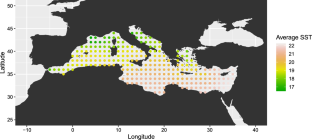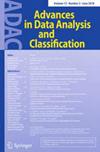气候数据的空间量化聚类
IF 1.3
4区 计算机科学
Q2 STATISTICS & PROBABILITY
引用次数: 0
摘要
在气候变化的时代,气候变量的分布随着变化而变化,并不局限于平均值。因此,基于中心倾向的聚类算法在用于总结空间和/或时间模式时可能会产生误导性结果。我们提出了一种基于定量的时间序列空间聚类新方法,该方法采用贝叶斯框架,在马尔可夫随机场的基础上加入了空间依赖层。一系列模拟测试了这一建议,然后将其应用于地中海的海面温度,地中海是最早受到气候变化影响的海域之一。本文章由计算机程序翻译,如有差异,请以英文原文为准。

Spatial quantile clustering of climate data
In the era of climate change, the distribution of climate variables evolves with changes not limited to the mean value. Consequently, clustering algorithms based on central tendency could produce misleading results when used to summarize spatial and/or temporal patterns. We present a novel approach to spatial clustering of time series based on quantiles using a Bayesian framework that incorporates a spatial dependence layer based on a Markov random field. A series of simulations tested the proposal, then applied to the sea surface temperature of the Mediterranean Sea, one of the first seas to be affected by the effects of climate change.
求助全文
通过发布文献求助,成功后即可免费获取论文全文。
去求助
来源期刊

Advances in Data Analysis and Classification
STATISTICS & PROBABILITY-
CiteScore
3.40
自引率
6.20%
发文量
45
审稿时长
>12 weeks
期刊介绍:
The international journal Advances in Data Analysis and Classification (ADAC) is designed as a forum for high standard publications on research and applications concerning the extraction of knowable aspects from many types of data. It publishes articles on such topics as structural, quantitative, or statistical approaches for the analysis of data; advances in classification, clustering, and pattern recognition methods; strategies for modeling complex data and mining large data sets; methods for the extraction of knowledge from data, and applications of advanced methods in specific domains of practice. Articles illustrate how new domain-specific knowledge can be made available from data by skillful use of data analysis methods. The journal also publishes survey papers that outline, and illuminate the basic ideas and techniques of special approaches.
 求助内容:
求助内容: 应助结果提醒方式:
应助结果提醒方式:


